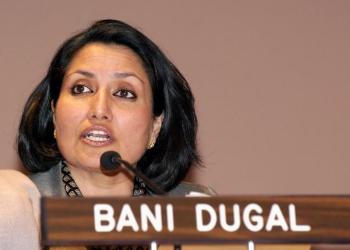Why is Faith Important in Addressing Global Challenges?
By Bani Dugal
Let’s be honest—some actors on the international stage want nothing to do with religion. The great majority of humankind orient their lives and decisions around spiritual teachings. But many businesses, civil society organizations, and governmental agencies prefer to steer clear of faith actors.
Such reservations are, unfortunately, not without justification. The name of religion has all too often been invoked in support of the worldly and the self-serving. And many today feel that religion is as much an obstacle as an asset in translating noble ideals into lived realities.
Yet a future worthy of humanity’s highest aspirations is defined as much by qualities of spirit such as equality, solidarity, generosity, and justice, as it is by material resources such as technology and infrastructure.
Societies that have disregarded the spiritual foundations at the heart of every religion have consistently struggled to address the challenges inherent in narrowly materialistic conceptions of reality—ills such as the unbounded drive toward accumulation and acquisition, the exaltation of power and prestige, the focus on self-satisfaction and idle comfort.
When true to its foundational ideals, religion has provided a bulwark against ideologies of materialism that would reduce human beings to mere resources to be exploited or consumers to be satiated. At its highest, religion has not only raised the call to virtues such as integrity, good character, high resolve, cooperation, and sacrificial endeavor, but has drawn growing numbers of individuals, institutions, and agencies together around such principles, unifying disparate elements and giving rise to cohesive communities working to manifest high ideals in action.
*
What do such patterns of partnership look like in practice?
Meaningful collaboration between faith actors and business as well as other stakeholders can take numerous forms, of course. One example that can be explored is from my own faith community, the Supporting Community Leaders program developed by the Fundación para la Aplicación y Enseñanza de las Ciencias (Foundation for the Application and Teaching of Science, in English).
The Supporting Community Leaders program assists young people living in rural regions of Colombia to pursue a path related to one or another trade or profession, with the aim of contributing to society. Youth take part in apprenticeships and technical or undergraduate degree programs, some being assisted to pursue a path of entrepreneurship by starting a production project or small business.
The program’s impact relies on partnerships with the community, local institutions, and private businesses within the region through classes, apprenticeships, internships, training, employment opportunities, scholarships, and funding opportunities.
The program includes vocational elements that would be familiar to many. But as a faith-based initiative, it seeks to advance wider objectives as well. It is grounded in the conviction that individuals’ sense of purpose and personal and professional growth cannot be divorced from active contribution to the betterment of society.
The program therefore focuses on raising participants’ awareness of who they are as human beings and cultivating a sense of purpose and belonging that is intimately connected to their tangible promotion of the common good. Ultimately, it aims to help participants choose a career path that will allow them to develop their personal talents and abilities, while simultaneously contributing to the prosperity of their families and communities.
Inspired by the teachings of the Baha’i Faith, the Supporting Community Leaders program serves more than 200 participants and about 2,000 indirect beneficiaries across three regions of Colombia, irrespective of background or belief. Its sister project, the Preparation for Social Action program is being carried out in 20 countries across Africa, Asia, Latin America, and the Pacific, reaching over 17,000 participants. Many graduates have gone on to start their own development initiatives, addressing a range of concerns related to health, the environment, conflict resolution, and economic prosperity.
*
What these programs—just two among many other examples undertaken by numerous actors of good will—give a glimpse of is the power and possibility of endeavors that draw on the best fruits of scientific and professional inquiry, on the one hand, and seek to leverage to their fullest the motivating power of values and virtues, morals and ideals, on the other.
We see the limitations and sometimes breakdown of many systems and structures organizing society today. These fractures in the global order signal a broader failure of narrowly materialistic conceptions of reality, the ideology on which much of that order ultimately rests.
Humanity’s existence, it becomes clear, is governed not only by physical forces, but also by social and moral laws of cause and effect, to which religion offers a profound source of insight. Greed is inherently corrosive to the common good, for example, no matter how artfully justified or concealed. Acts of selfless compassion invariably hold the power to motivate and inspire, no matter how seemingly simple or isolated.
From this perspective, the path to a prospering, peaceful, and sustainable world cannot be one of technological adjustment alone. It must also involve communities and societies learning to align themselves with higher principles.
This has long been the aim of faith communities. Unlocking the high-minded qualities latent in every individual has been a central concern of religious teachings for millennia. How such ideals come to infuse the thinking and behavior of growing numbers, for the betterment of all, are questions of central importance, then, not only to faith actors themselves, but to all who are working to find lasting solutions to pressing global challenges.
Bani Dugal is Principal Representative of the Bahá’í International Community United Nations Office
